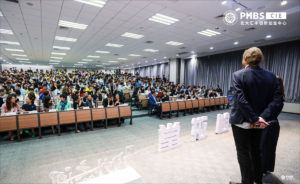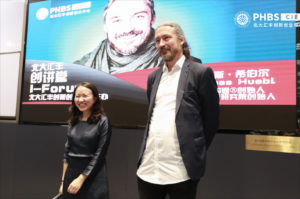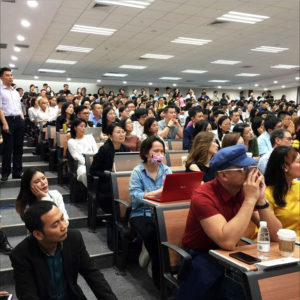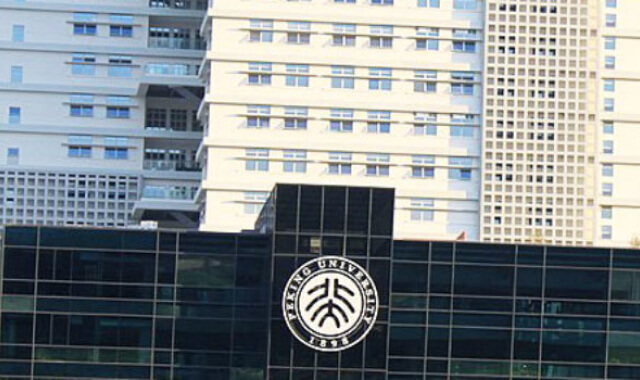The Symbiosis between the Internal and the External
When Thomas Hübl entered the lecture hall at Peking University HSBC Business School (PHBS), few could have imagined the spiritual advice offered over the next two hours by having registered for a talk on entrepreneurship. The standing-room-only audience of more than 300 students and entrepreneurs, and the 74,000 people who followed the event via livestream, was provided more than just a toolbox for repairing problems for a firms’ issues. Hübl invited listeners to “search for the intrinsic functioning of things in order to better understand them and thus better understand ourselves.”

In 17 years of work that has taken him around the world, Hübl has guided thousands of people along their inner journey. Defined as “a modern mystic, a spiritual teacher whose work integrates the core insights of the great wisdom traditions with the discoveries of contemporary science,” Hübl illuminated both in early April with his profound understanding.
Belonging vs Becoming
Hübl observed that regardless of cultures or personalities, humans face life challenges centered around two fundamental forces: belonging versus becoming. He provided a simple metaphor to help the audience understand this concept. “Imagine a child in a public garden clinging to his mother’s skirts, an ideal refuge where trust and love reign. After some time, the child gets bored and feels adventurous. He wants to play with other children and experiment with new things. While playing with others, unfortunately, he falls to the ground. Crying, he returns to his mother’s skirts to find refuge and dry his tears. When confidence and courage are back again, the child will go out to play and experiment again.”

Life is like this metaphor, Hübl said. It’s a constant balance of these two forces, belonging, the force that relates to your environment, and becoming, the force that leads to personal development. For a child, this balance is supported by a healthy family environment. For a business, the concept is the same but relates to the employee. Hübl said that leaders must cultivate a meaningful work environment where healthy relationships and healthy perspectives can grow. Only a sustainable environment will allow employees to be happy and potential-oriented. So, to find the balance between belonging and becoming in a company, the leader must first reach this internal balance.
Presence
Your inner balance and your company balance can only be reached if you are your “true-self,” said Hübl. To strike this balance, you must be present for others and for yourself.

He provided another example. Every day is an emotional journey where we accumulate and carry our emotions like a piece of luggage: an argument with your spouse at breakfast, someone shoving you in the street or an unpleasant email you read on your way to work, are examples. The more emotions one carries around, the heavier the bag becomes and more difficult it is to carry. This weight prevents many of us from being emotionally present and mentally available for situations that arise in our professional lives.
The Responsibility of a Leader
The responsibility of a leader, Hübl said, is to be present for the team to understand team members’ difficulties; a leader who is present will be a better guide for the team. A simple way to formulate this approach for the most novices among us would be through one of the famous life lessons thought by the famous 13th-century Persian poet Jalāl ad-Dīn Muhammad Rūmī “Look for the answer inside your question“. In other words, difficulties in our everyday lives originate internally rather than externally. So by identifying the starting point of difficulties, we can better solve them. Hübl said that the more a leader nurtures self-knowledge and personal growth, the more clearly s/he can relate to others.
By Franklin PETER (Thank you!)
Edited by Priscilla Young and Annie Jin April 2019
Original article on the website of Peking University HSBC Business School
